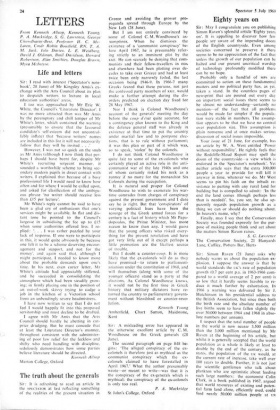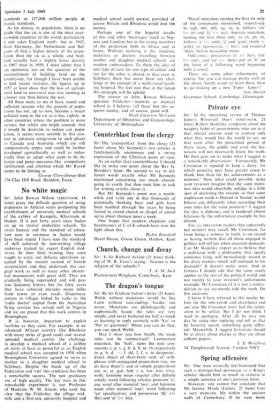Eighty years on
Sir: May I congratulate you on publishing Simon Raven's splendid article 'Eighty years on'. It is appalling to discover how few people are aware of the impending doom of the English countryside. Even among societies concerned to preserve it there seems to be no appreciation of the fact that unless the growth of our population can be halted and our present uncritical worship of technology profoundly modified there can be no hope.
Probably only a handful of mes are committed to action on these fundamental matters and no political party has, as yet, taken a stand. In the countless pages of newsprint that are poured out every day on important social issues there seems to be almost no understanding—certainly no mention—of the fact that all problems would be made far simpler if the popula- tion were stable in numbers. The assump- tion appears to be that we have no control over population size. This assumption is plain nonsense and at once makes serious discussion of social issues impossible.
Your issue of 21 June, for example, has an article by W. A. West entitled 'Power without responsibility'. He rightly feels that the Redcliffe-Maud Report may spell the doom of the countryside—a view which is endorsed in the 'Spectator's notebook'. Yet neither article says that the extra 300,000 people a year to provide for will kill it anyway in time, whatever we do. Mr West seems to pin his faith on the inbuilt re- sistance to parting with any rural land for building but is compelled to admit: In the end the land comes (though perhaps less than is needed)'. So, you see, he also ap- parently regards population growth as a thing we can or should do nothing about. In heaven's name, why?
Finally, may I say that the Conservation Society was founded expressly for the pur- pose of making people think and act about the matters Simon Raven raises.
S. G. Lawrence The Conservation Society, 21 Hanyards Lane, Cuff ley, Potters Bar, Herts
Sir: Simon Raven (21 June) asks why nobody warns us about the population ex- plosion. 1 suppose the answer is that by world standards the inc's rate of population growth (0.7 per cent p.a. in 1963-1966 com- pared to a world average of 2 per cent) is so low that it hardly seems feasible to re- duce it much further by exhortation. In 1966 a warning was delivered by Sir J. Hutchinson in his presidential address to the British Association, but since then both the birth rate and the absolute number of live births seem to have fallen slightly (by over 50,000 between 1964 and 1968 in abso- lute numbers per annum).
I suspect that the total number of people in the world is now nearer 3,500 million than the 3,000 million mentioned by Mr Raven at the beginning of his article, but whilst it is generally accepted that the world population as a whole is likely at least to double by the end of the century, as he states, the population of the UK would, at the current rate of increase, take well over 100 years to double. Further, it is not just the scientific gentlemen who talk about plankton who are optimistic about feeding such large numbers: the economist Colin Clark. in a book published in 1967, argued that world resources of existing and poten- tial farm land alone, efficiently used, could feed nearly 50,000 million people at us
standards or 157,000 million people at Asiatic standards.
As for density in population, there is no doubt that the ux is one of the most over- crowded countries in the world, particularly if one takes England itself : but in 1967, West Germany, the Netherlands and Bel- gium all had a higher density of the popu- lation than the Lac as a whole, and Scot- land actually had a slightly lower density
in 1967 than in 1959. 1 must admit that I
am optimistic too on the question of the encroachment of building land on the countryside, for though I have been unable to find recent statistics, the figures up to 1957 at least show that the loss of agricul- tural land to non-rural uses was running at a lower rate than before the war.
All these seem, to me at least, sound and sufficient reasons why the growth of popu- lation has not, up to now, become a major political issue in the ux as it has, rightly, in other countries where the problem is more serious; but whilst one might concede that it would be desirable to reduce our popu- lation, it seems more sensible in this con- text to advocate emigration to such places as Canada and Australia which are still comparatively empty and could be further
developed agriculturally as well as indus- trially than to adopt what seem to be de- featist and panic measures like compulsory sterilisation and abortion which Mr Raven seems to be hinting at.



































 Previous page
Previous page